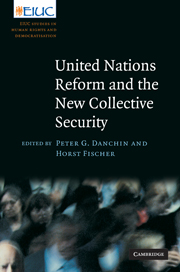Book contents
- Frontmatter
- Contents
- List of contributors
- Series editors' preface
- Preface
- List of abbreviations
- Introduction: the new collective security
- PART I Law and politics in United Nations reform
- PART II Defining “threats” to collective security
- PART III Prevention and responses
- PART IV Perspectives on the ground
- Bibliography
- Index
Series editors' preface
Published online by Cambridge University Press: 05 May 2010
- Frontmatter
- Contents
- List of contributors
- Series editors' preface
- Preface
- List of abbreviations
- Introduction: the new collective security
- PART I Law and politics in United Nations reform
- PART II Defining “threats” to collective security
- PART III Prevention and responses
- PART IV Perspectives on the ground
- Bibliography
- Index
Summary
This book is the second in the new series of EIUC Studies in Human Rights and Democratization. The first book in the series was Economic Globalization and Human Rights, edited by Wolfgang Benedek, Koen de Feyter, and Fabrizio Marrella (Cambridge University Press, 2007). The European Inter-University Centre for Human Rights and Democratization (EIUC) in Venice, Italy is the principal European human rights and democratization center supported by almost 40 renowned European universities, the European Union, the Region of Veneto, the City of Venice and other strategic partners. Professors, researchers, teachers, and experts from all over Europe and from different scientific disciplines and partner organizations are active in the Centre's programs and teaching activities. One of the main objectives of the EIUC is to create a fertile environment for research and research cooperation and the transformation of the results of that cooperation into realistic policies. The EIUC studies aim to publish the best scholarly work on Human Rights and Democratization resulting from that process of academic cooperation in the Venice Centre and its member universities. The series is not limited to lawyers' discourse alone. It encompasses the scientific disciplinary and interdisciplinary dialogue on Human Rights and Democratization as practiced in research and teaching in the Centre's activities.
This second book reflects in approach and outcome the overall aim of the EIUC series to enrich the academic discourse on Human Rights and Democratization with innovative contributions which also facilitate the transfer of academic and institutional expertise into the public sphere.
- Type
- Chapter
- Information
- United Nations Reform and the New Collective Security , pp. xiii - xivPublisher: Cambridge University PressPrint publication year: 2010



